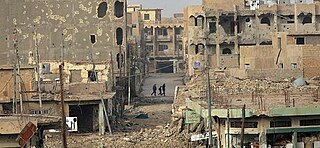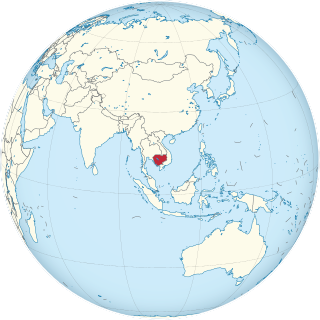Related Research Articles

Squatting is the action of occupying an abandoned or unoccupied area of land or a building, usually residential that the squatter does not own, rent or otherwise have lawful permission to use. The United Nations estimated in 2003 that there were one billion slum residents and squatters globally. Squatting occurs worldwide and tends to occur when people find empty buildings or land to occupy for housing. It has a long history, broken down by country below.

Human rights in post-invasion Iraq have been the subject of concerns and controversies since the 2003 U.S. invasion. Concerns have been expressed about conduct by insurgents, the U.S.-led coalition forces and the Iraqi government. The U.S. is investigating several allegations of violations of international and internal standards of conduct in isolated incidents by its own forces and contractors. The UK is also conducting investigations of alleged human rights abuses by its forces. War crime tribunals and criminal prosecution of the numerous crimes by insurgents are likely years away. In late February 2009, the U.S. State Department released a report on the human rights situation in Iraq, looking back on the prior year (2008).

The Iraqi civil war was an armed conflict from 2006 to 2008 between various sectarian Shia and Sunni armed groups, such as the Islamic State of Iraq and the Mahdi Army, in addition to the Iraqi government alongside American-led coalition forces. In February 2006, the insurgency against the coalition and government escalated into a sectarian civil war after the bombing of Al-Askari Shrine, considered a holy site in Twelver Shi'ism. US President George W. Bush and Iraqi officials accused Al-Qaeda in Iraq (AQI) of orchestrating the bombing. AQI publicly denied any links. The incident set off a wave of attacks on Sunni civilians by Shia militants, followed by attacks on Shia civilians by Sunni militants.

Throughout the 20th century, Iraq witnessed multiple periods of instability and conflict that prompted the creation and flight of many refugees. Earlier examples include the exodus of Iraqi Jews and the flight of Iraqi Kurds. The Iraqi invasion of Iran in 1980 and the ensuing Iran–Iraq War (1980–1988) triggered a deterioration of ties among the country's various ethnic and religious communities, and also exacerbated in violent events like the Ba'athist Arabization campaigns in northern Iraq (1968–2003), which led to the killing and displacement of thousands of minorities. The Iraqi invasion of Kuwait (1990) and the ensuing Gulf War (1990–1991), which ended with Iraq's defeat and the application of United Nations sanctions (1991–2003), also resulted in the creation of many Iraqi refugees. It was not until the beginning of the ongoing Iraqi conflict, however, that sustained waves of Iraqi refugees would be created, numbering in the millions: the 2003 invasion of Iraq and the ensuing Iraq War (2003–2011) killed and displaced hundreds of thousands of Iraqis, both internally and externally, and the later War in Iraq (2003–2017) forced even more people to flee from the country. Many Iraqi refugees established themselves in urban areas of other countries rather than in refugee camps.
Camp Ashraf or Ashraf City was a camp in Iraq's Diyala Governorate, having the character of a small city with all basic infrastructure, and headquarters of the People's Mujahedin of Iran (PMOI/MEK). The population used to be around 3,400 in 2012, but in 2013 nearly all were relocated to Camp Liberty near Baghdad International Airport after pressure by then-prime minister Nouri al-Maliki's office.

The Iraqi diaspora refers to native Iraqis who have left for other countries as emigrants or refugees, and is now one of the largest in modern times, being described by the UN as a "humanitarian crisis" caused by the 1991 Gulf War and 2003 invasion of Iraq and by the ensuing war.

Palestinians in Iraq are people of Palestinians, most of whom have been residing in Iraq after they were displaced in 1948. Before 2003, there were approximately 34,000 Palestinians thought to be living in Iraq, mainly concentrated in Baghdad. However, since the 2003 Iraq War, the figure lies between 10,000–13,000, although a precise figure has been hard to determine. The situation of Palestinians in Iraq deteriorated after the fall of Saddam Hussein and particularly following the bombing of the Al-Askari Mosque in 2006. Since then, with the rise in insecurity throughout Iraq, they have been the target of expulsion, persecution and violence by Shia militants, and the new Iraqi Government with militant groups targeting them for preferential treatment they received under the Ba'ath Party rule. Currently, several hundred Palestinians from Iraq are living in border camps, after being refused entry to neighbouring Jordan and Syria. Others have been resettled to third countries.
Since the late 1970s until the present, Iraq has witnessed numerous waves of refugees and emigrants due to significant events in its modern history. These events have led to the displacement of millions of Iraqis. These include over three decades of repression, periodic violent attacks, and massacres targeting the Kurdish population in the north and the Shi'a in the south, all carried out by Saddam Hussein's regime. Other factors include the Iran-Iraq War (1980-1988), the Gulf War of 1991, the prolonged economic sanctions until the overthrow of Saddam Hussein, and the 2003 US-led invasion of Iraq.
The Iraq War resulted in multiple humanitarian crises.
Iraqis in Turkey includes Turkish citizens of Iraqi origin, Iraqi-born citizens and Iraqi expat workers.
The number of people who are currently displaced inside Iraq is estimated to be 3 million, almost one out of every ten Iraqis. This figure is cumulative and represents both those displaced before and after the 2003 US-led invasion. Displacement in Iraq is "chronic and complex:" since the 1960s Iraq has produced the largest population of Internally Displaced Persons (IDPs) and refugees of any state in the Middle East.

In England and Wales, squatting – taking possession of land or an empty house the squatter does not own – is a criminal or civil offence, depending on circumstances. People squat for a variety of reasons which include needing a home, protest, poverty, and recreation. Many squats are residential; some are also opened as social centres. Land may be occupied by New Age travellers or treesitters.
In the United States, squatting occurs when a person enters land that does not belong to them without lawful permission and proceeds to act in the manner of an owner. Historically, squatting occurred during the settlement of the Midwest when colonial European settlers established land rights and during the California Gold Rush. There was squatting during the Great Depression in Hoovervilles and also during World War II. Shanty towns returned to the US after the Great Recession (2007–2009) and in the 2010s, there were increasing numbers of people occupying foreclosed homes using fraudulent documents. In some cases, a squatter may be able to obtain ownership of property through adverse possession.
A refugee crisis can refer to difficulties and dangerous situations in the reception of large groups of forcibly displaced persons. These could be either internally displaced, refugees, asylum seekers or any other huge groups of migrants.

Squatting in Australia usually refers to a person who is not the owner, taking possession of land or an empty house. In 19th century Australian history, a squatter was a settler who occupied a large tract of Aboriginal land in order to graze livestock. At first this was done illegally, later under licence from the Crown.

Squatting in Serbia refers to the unauthorised occupation of land or buildings. Following World War I, shanty towns emerged in the mostly demolished capital Belgrade, the most notable example being Jatagan Mala. The population of Belgrade rose from 593,000 in 1953 to 1,470,000 in 1981. Between 1961 and 1971, 52% of all private construction of houses in Belgrade was illegal. The percentage was also high in other cities such as Novi Sad and Smederevo. The reasons for squatting and illegal construction were the lack of affordable housing, bad governance and the bureaucracy involved in legalising land clams. Also the punishments were light.

Squatting is common in the country of Cambodia. Following the Khmer Rouge and the Pol Pot regime, the new democratic government introduced land reform. In the capital Phnom Penh, where in 2003 an estimated 25 per cent of the population was squatting, there are informal settlements and occupied buildings.

Squatting in Liberia is one of three ways to access land, the other two being ownership by deed or customary ownership. The informal settlement West Point was founded in the capital Monrovia in the 1950s and is estimated to house between 29,500 and 75,000 people. During the First Liberian Civil War 1989–1997 and the Second Liberian Civil War 1999–2003, many people in Liberia were displaced and some ended up squatting in Monrovia. The Ducor Hotel fell into disrepair and was squatted, before being evicted in 2007. In the early 2020s, over 9,000 Burkinabés were squatting on remote land and the Liberia Land Authority (LLA) announced a plan to title all land in the country.

Squatting in Asia occurs when land or buildings are occupied without formal right of tenure. Following the end of World War II and the collapse of many colonial regimes, there was a huge net migration from rural to urban areas across Asia, which resulted in people living in informal settlements. By the 2010s, places such as Hong Kong and Singapore succeeded in reducing the number of squatters, whereas in Bangkok and Jakarta still have high numbers. Factors such as war and natural disaster can result in displacement and squatting.

Squatting in Scotland is criminalised by the Trespass Act 1865. Following the Highland Clearances, land raids occurred across rural Scotland in the late nineteenth and early twentieth centuries, for example in Vatersay and Knoydart. More recently there have been land occupations as both road protests and as part of the Occupy movement. Baile Hoose was occupied during the 2021 United Nations Climate Change Conference in Glasgow.
References
- ↑ "Iraqi bourse seeks rebirth after squatters move in". Khaleej Times. Reuters. 2 August 2003. Retrieved 11 November 2021.
- ↑ Carroll, Rory (3 April 2005). "Squatters in ruins of Iraq build hopes on new government". The Guardian. Retrieved 11 November 2021.
- ↑ McEvers, Kelly (15 July 2010). "Legions Of Iraqi Squatters Grow Even As War Recedes". NPR. Retrieved 11 November 2021.
- ↑ Biddle, Stephen; Friedman, Jeffrey A.; Shapiro, Jacob N. (July 2012). "Testing the Surge: Why Did Violence Decline in Iraq in 2007?". International Security. 37 (1): 7–40. doi:10.1162/ISEC_a_00087. S2CID 6328079.
- 1 2 Kareem, Ali. "Homeless Iraqis Prompt Fears of Social Crisis". IWPR. Retrieved 11 November 2021.
- ↑ "Iraq: Squatters moved out of nearly two thirds of returnees' homes - Iraq". ReliefWeb. TNH. 10 January 2010. Retrieved 11 November 2021.